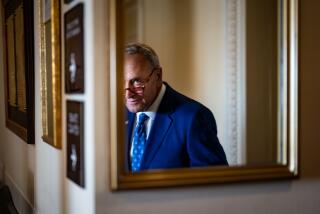Panel to Study Ending Itemized Deductions : Packwood Sees Little Hope for Tax Bill
- Share via
WASHINGTON — Senate Finance Committee Chairman Bob Packwood (R-Ore.), keeping himself at arm’s length from a radical new congressional staff proposal to eliminate all itemized deductions and reduce the maximum individual tax rate to 25%, acknowledged Friday that he does not yet see a way of breathing new life into the ailing tax overhaul bill.
Packwood said that the panel will continue to explore the new ideas presented by tax specialists on Congress’ Joint Taxation Committee--even though it is highly unlikely that the Finance Committee would wipe out such politically sacrosanct tax breaks as the deductions for mortgage interest and charitable contributions, as the staff has proposed.
At a news conference hastily called after details of the staff proposal leaked to the press Thursday, Packwood confessed that he is no longer confident that he can get a tax revision bill out of his panel next month.
Steps Away From Vow
“I don’t have any set timetables,” Packwood said Friday, stepping away from a longstanding vow to finish committee work in time to get the bill to the Senate floor at the beginning of June. “I have no idea” what it will take to get a bill adopted, he said, “until we hold three or four meetings.”
Last week, Packwood called off efforts to draft a tax bill in public sessions after the committee had expanded several existing business tax preferences rather than narrowing them and was on the verge of rejecting his plan to trim the state and local tax deduction.
The panel is scheduled to meet again in closed session Tuesday.
Although most members of the committee say they favor reducing tax levels from the current top rate of 50%, Packwood said he is unsure whether they are willing to prune enough existing preferences from the tax code to pay for drastically lower rates.
“I have no accurate gauge” of the mood of the committee, conceded Packwood, who is serving his first term as chairman. Despite kind words from many panel members for the new proposal, he said later that “I’m not sure I see it yet as a way of retrieving (tax revision) for anybody.”
Packwood acknowledged that the entire tax overhaul plan, which was approved last December in the Democratic-controlled House, is now in limbo in his Senate committee. He said his original proposal, which the panel had spent several weeks modifying, “for the moment is just put aside in abeyance.”
“The committee was asked to start (over again) from square one,” he said. “It was clear we were not making any progress on square two.”
Packwood said he has not discussed the new approach with the White House. A Treasury official involved in the tax overhaul debate said that Administration officials are growing increasingly discouraged by the lack of progress in the Senate committee.
“I can understand why (Packwood) is trying these shock tactics,” the official said after agreeing to talk only on condition that he not be identified, “but it looks like it will just give the members another excuse to delay.”
Under Packwood’s original proposal--which more closely resembled the House bill and President Reagan’s plan than the latest staff proposal--the existing multi-tiered tax schedule with rates ranging from 14% to 50% would shrink to a three-level system with a top rate of 35%.
Most current personal deductions would continue, with much of the rate reductions paid for by shifting as much as $120 billion in the five-year individual tax burden onto corporations. Another $75 billion over five years would be raised through excise tax increases, a key feature of Packwood’s plan that was expected to be largely rejected by the committee.
The new proposal offered by the Joint Taxation Committee staff experts, however, would make an even sharper break from the current system by eliminating all itemized deductions, abolishing the individual retirement account deduction, and ending the favorable tax treatment for capital gains.
A simple two-rate system would be adopted, with rates set at 15% and 25%. Married taxpayers, for example--after subtracting from their gross income a standard deduction of $4,650 and $2,000 for each family member--would pay a 15% rate on taxable income up to $35,000, and 25% on income above that level.
About $70 billion in additional taxes over five years would be shifted to corporations, and most business tax preferences would be preserved. Only about $25 billion over five years in excise tax increases would be required to ensure that the plan would raise about the same revenues as the current tax code.
More to Read
Get the L.A. Times Politics newsletter
Deeply reported insights into legislation, politics and policy from Sacramento, Washington and beyond. In your inbox three times per week.
You may occasionally receive promotional content from the Los Angeles Times.









